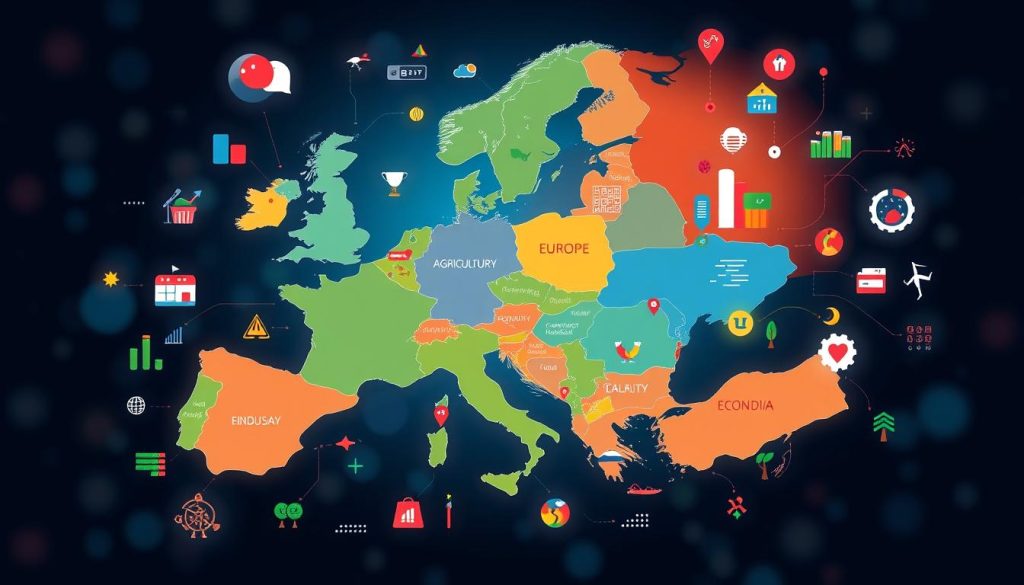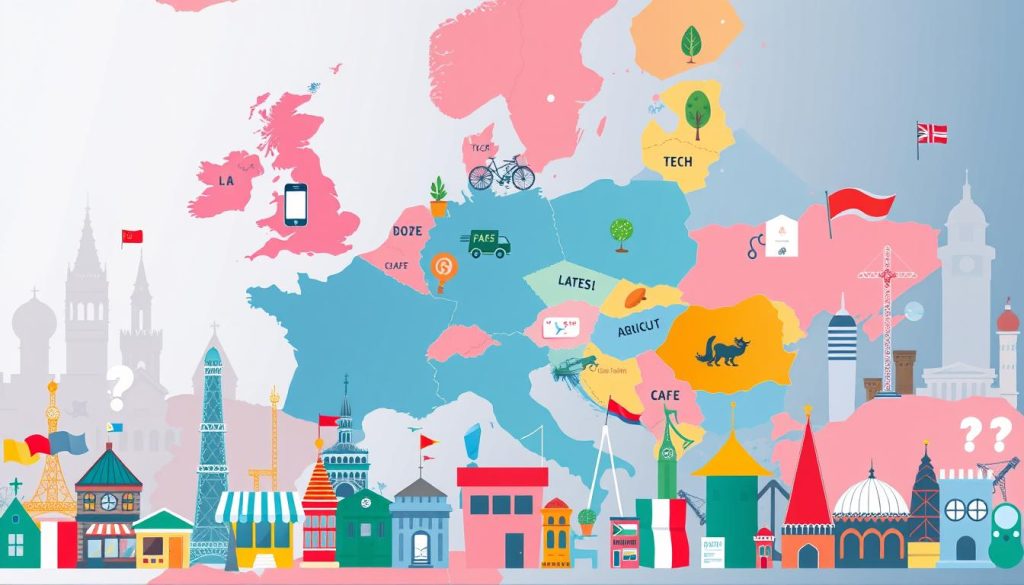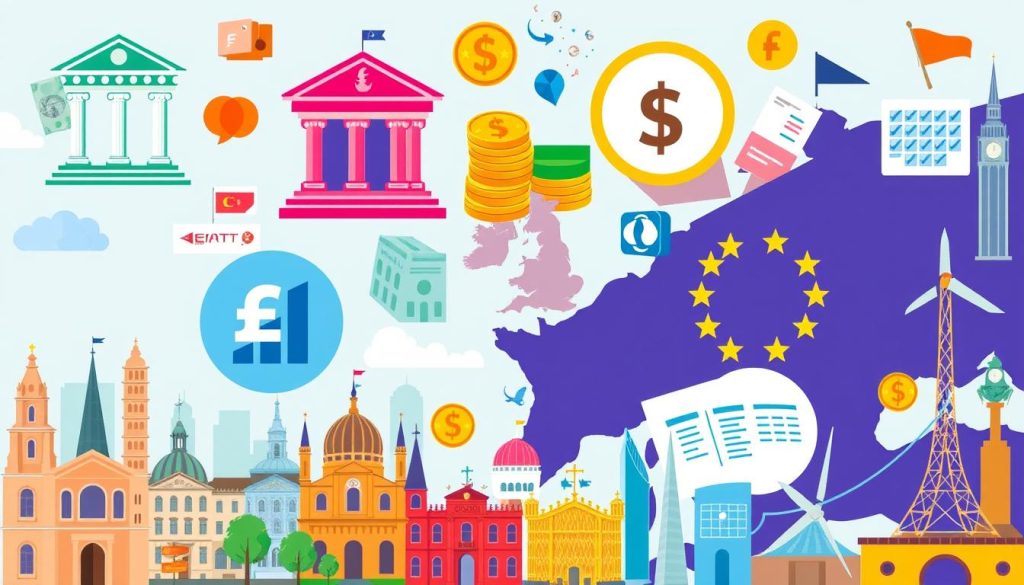Starting a small business in Europe is full of chances, especially for UK entrepreneurs. They can explore different markets. The data shows that small businesses are growing in many areas.
The European scene is diverse and full of potential. But, there are also big challenges. These need a special strategy to overcome.
It’s important to know the economic and rules of the European Union. This knowledge is key for success in this competitive field.
Understanding the European Market

Getting to know the European market is key for businesses wanting to succeed. An in-depth analysis can reveal important details like how people shop and spend money. These habits change a lot from one country to another.
Segmenting the market helps businesses understand different groups of customers. By looking at who they are and what they need, companies can make products that fit better. This way, they can really connect with their audience.
There are big differences in the economy, culture, and what people can afford across Europe. For example, Eurostat shows that how much money people make and spend varies a lot. Businesses need to consider these differences to meet local needs.
The Benefits of Starting a Small Business in Europe

Starting a small business in Europe has many benefits. It can help the economy grow a lot. One big plus is getting to a huge number of customers. The European Union and the European Economic Area open up many markets.
There’s also a wide range of skills to draw from. This makes businesses more innovative and creative. It brings new ideas to solve today’s business problems.
Support networks are key to success. Many groups offer help, like mentorship and funding. Governments also give grants and tax breaks to help small businesses grow.
Free trade agreements make trading easier. This reduces barriers and makes things simpler. All these points show why starting a small business in Europe is a great idea for entrepreneurs.
How to Start a Small Business in Europe

Starting a small business in Europe needs careful planning. You must research your target audience and understand market trends. Knowing these things is crucial for entrepreneurs aiming to stand out in a competitive field.
Researching Your Target Audience
Effective target audience research involves studying consumer preferences and habits. Knowing what drives your potential customers helps shape your products and marketing. There are several ways to do this:
- Surveys for direct feedback on consumer needs.
- Focus groups to gather qualitative insights.
- Data analytics tools for quantitative data on demographics and buying patterns.
Using these methods helps small business owners meet market demands. This increases their chances of success.
Identifying Market Trends
Staying on top of market trends is essential in the ever-changing business world. Market analysis helps spot current trends and predict future changes in consumer demands. Useful tools include:
- Industry reports for detailed market analyses.
- Competitor analysis to see what others are doing.
- Online resources like market research databases and trade publications.
Knowing about market trends helps make informed decisions. It allows for strategic adjustments to your business, keeping it relevant and adaptable to changes.
Choosing the Right Country for Your Business

Choosing the right country for your business is crucial for success. Europe offers many countries with different advantages and challenges. It’s important to understand these to make the best choice.
Some European countries are especially good for business. For example:
- Germany: It has a strong economy, good infrastructure, and a skilled workforce.
- The Netherlands: It’s great for international trade because of its location and logistics.
- Ireland: It’s known for low corporate taxes, attracting tech and pharmaceutical companies.
When choosing a country, think about market access, simple regulations, and quality of life. These factors are key to your business’s success in Europe.
Legal Requirements for Starting a Small Business in Europe

Starting a small business in Europe is complex. Each country has its own rules. It’s key to know about business registration and tax laws for success. This section explains the formation process, focusing on registration and legal needs for the European market.
Business Registration Processes
Registering your business is a crucial first step. The process varies across Europe. Important things to think about include:
- Choosing the right business structure, like sole trader or limited company.
- Gathering needed documents, like ID, proof of address, and a business plan.
- Meeting local rules, ensuring you follow all legal requirements.
Registration times and costs vary a lot. It’s important to research before choosing a location. Some places have easier processes, while others need more paperwork or longer waits.
Understanding Tax Obligations
Knowing tax laws is essential for starting a business in Europe. You need to understand:
- Income and corporate tax rates, which change by country and affect profits.
- VAT rules, important for pricing and meeting tax authorities’ demands.
- Possible tax deductions, helping with financial planning.
Talking to tax experts can help with tax planning and EU tax rules. Keeping up with tax law changes is also crucial for your business’s future.
Funding and Financial Considerations

Getting the right financial support is key for any small business in Europe. There are many funding options, each suited to different needs and stages. Knowing where to find money and what options are out there can really help your business grow.
Identifying Potential Funding Sources
There are many types of investors for small businesses. This lets you pick the best one for your goals. Some common ones are:
- Bank loans, which give money based on how good your credit is.
- Angel investors who invest their own money in new businesses.
- Venture capital firms, which look for high-growth startups and take a share of the business.
It’s important to have a strong financial plan when looking for investors. Show them a clear business plan and how you expect to make money. This will help you get the funding you need.
Understanding European Grant Opportunities
There are also EU grants that can help new businesses. These grants give money without needing to pay it back. They are very helpful. Some notable grants include:
- The European Regional Development Fund, which helps reduce differences between regions.
- National funding programmes that support specific areas like technology and innovation.
Each grant has its own rules and how to apply. It’s crucial for entrepreneurs to do their homework. Knowing this can increase your chances of getting a grant and getting the financial help you need.
Creating a Business Plan

A good business plan is like a roadmap for success in Europe’s competitive market. It’s vital to plan well to make sure it meets your business goals and local market needs.
What makes a business plan strong includes:
- Market Analysis: Do deep research on your industry and who you’re selling to. Knowing what customers want and market trends helps shape your strategy.
- Financial Forecasting: Show clear plans for your money, like how much you’ll make and spend. This is key for getting funding.
- Operational Planning: Explain how your business will run, from getting supplies to hiring staff. Being clear here boosts efficiency.
- Marketing Strategy: Say how you’ll find and keep customers in Europe. Using digital marketing and social media is important.
Writing a business plan helps with planning and shows confidence to investors and partners. A clear plan shows you’re serious about growing and lasting in Europe.
Networking and Building Relationships

Networking is key in building business relationships in Europe. It opens doors to growth and collaboration. Entrepreneurs need to develop good networking strategies to meet peers and clients.
- Attend industry events and conferences to meet like-minded professionals.
- Join business associations that align with your sector for access to networks and resources.
- Utilise online platforms, such as LinkedIn, to connect with industry leaders and potential collaborators.
- Participate in local meetups or seminars to expand your circle and gain new insights.
Building strong connections takes time and effort. It’s important to have meaningful talks, follow up, and help others. This way, you can build a strong base for your business in Europe.
Understanding Cultural Differences in European Markets

In Europe, knowing about cultural differences is key to success in business. It helps entrepreneurs talk clearly and show respect. Every country has its own way of doing business, making it important to be sensitive to culture.
How people communicate varies across Europe. Northern Europeans often speak directly, while Southern Europeans might be more indirect. Knowing these differences can make business talks better and build stronger partnerships. Business manners also change from place to place, affecting things like how to meet and what gifts to give.
- Negotiation Techniques: In some cultures, building rapport comes first, while others like to get straight to the point.
- Customer Expectations: People in different countries might value quality or price more, depending on where they are.
- Decision-Making Processes: Knowing if decisions are made alone or together can change how you present ideas.
Having a business approach that respects these cultural differences can really help in Europe. Adapting to local customs makes deals smoother and improves professional relationships. This can lead to successful business ventures.
Marketing Your Small Business in Europe

To market a small business in Europe well, you need to know about different ways to reach people. Using digital marketing can really help your brand stand out and connect with customers. It’s also key to use new marketing ideas to beat the competition and find the right audience.
Leveraging Digital Marketing Strategies
Digital marketing is a big help for businesses wanting to make it big in Europe. Here are some important points:
- SEO Optimisation: Making your website better for search engines brings more visitors and makes your brand known.
- Email Marketing: Sending out emails that are just for your customers helps keep them coming back and loyal to your brand.
- Content Marketing: Sharing useful content on your site builds trust and shows you’re a leader in your field.
- Multi-Lingual Online Presence: Using local languages on your site makes sure you talk to everyone in Europe, making your message clear and relatable.
Utilising Social Media Platforms
Social media is a big deal for businesses wanting to talk to customers and grow their brand. Here’s how to do it right:
- Selecting the Right Platforms: Knowing who uses Facebook, Instagram, and LinkedIn helps you focus your efforts where they count the most.
- Engaging Content: Making your content interesting and appealing gets more people talking and interacting with your brand.
- Community Building: Creating a community around your brand makes customers loyal and encourages them to share their thoughts and ideas.
Utilising Government Support and Resources

Starting a small business in the UK can be tough. But, there are many government resources to help. These resources offer vital support and can provide financial help when you need it.
There are many types of government resources for new businesses. These include:
- Grants and funding for certain sectors or groups
- Consulting services for planning and strategy
- Networking events and workshops to connect with others
- Tax relief to reduce financial stress
Entrepreneurs can find lots of information on local government websites and agencies. These sites often have updates on financial help. Using these resources can give you financial benefits and support tailored to your needs.
Adapting Your Business Model for Success

In today’s fast-changing world, being able to change your business model is key for small businesses to last. Being flexible helps them adjust to market changes, keeping them strong in tough times.
- Regular Market Analysis: Keep up with new trends and how customers are changing.
- Product and Service Evolution: Update what you offer based on what people want and need.
- Operational Agility: Make your processes smoother to quickly respond to market shifts.
- Investment in Technology: Use tech to make your business more efficient and adaptable.
By being open to change, businesses can meet customer needs better and beat their rivals. Focusing on adapting your business model leads to innovation. It also makes your company a leader in a changing market.
Challenges to Anticipate When Starting a Business in Europe

Starting a small business in Europe comes with many challenges. These can affect how your business runs. It’s important to know about these issues to build a strong business in a changing market.
Economic Fluctuations
Economic problems in Europe include market ups and downs. These can affect money values and prices. Small businesses face:
- Higher costs for goods from other countries because of money value changes.
- Changes in prices affecting what people can buy and how they spend.
- Big economic crises that can change the market a lot.
To deal with these issues, businesses need good risk management. They should keep up with market trends and check their finances often.
Regulatory Changes
Regulatory issues are also big challenges. Changes in EU laws and local rules can affect how businesses operate. Small businesses may face:
- Often changing policies on taxes and work laws.
- More rules to follow, needing updates in documents and practices.
- Political changes affecting trade rules and how easy it is to do business.
By being proactive and keeping up with regulatory changes, business owners can prepare. This helps them follow the law and keep their business running smoothly.
Resources for Small Business Entrepreneurs in Europe
Starting a small business in Europe can be both rewarding and challenging. Entrepreneurs need to use many business resources to overcome these hurdles. The European Union’s Enterprise Europe Network is a great place to find information and tools.
Mentorship programmes are very helpful. They are offered by local chambers of commerce and business acceleration initiatives. These programmes connect new entrepreneurs with experienced business professionals. They also help with networking, which can lead to valuable partnerships.
Government support links, like grants and funding, are also key. Entrepreneurs should look into programmes for different sectors and regions. Reading books on entrepreneurship can also give valuable insights and strategies. Using these resources can greatly improve a small business’s chances of success in Europe.
















